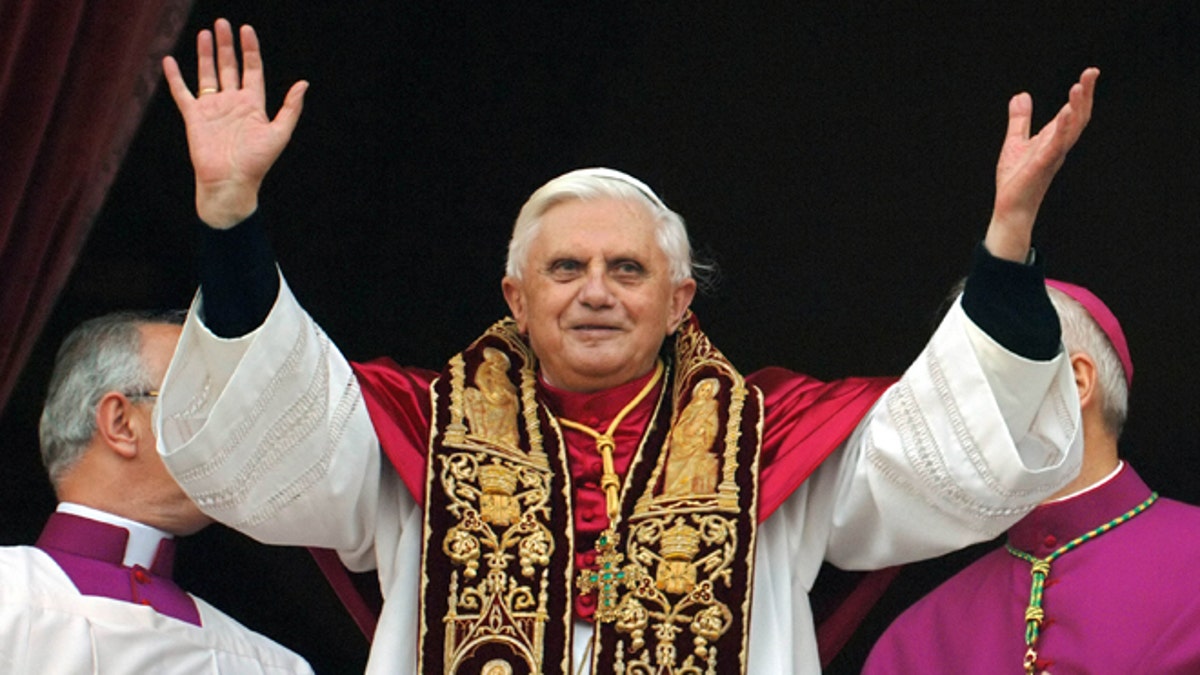
April 19, 2005: Pope Benedict XVI greeting the crowd from the central balcony of St. Peter's Basilica moments after being elected, at the Vatican. On Monday, Benedict XVI announced he would resign Feb. 28, the first pontiff to do so in nearly 600 years. The decision sets the stage for a conclave to elect a new pope before the end of March. (AP)
Really, isn’t it time for the Church of Rome to look beyond Europe when it picks the 267th pope? And might it not cast its gaze to Latin America, the most concentrated cluster of Catholics in the world?
The answer, sadly, is probably not.
The shock announcement of the resignation of Pope Benedict XVI sets up a papal conclave unlike any in living memory. The physical presence of a pope emeritus in the Vatican will undeniably affect how those cardinals who gather in the Sistine Chapel will determine his successor.
And, as tempting as it might be for those princes of the church to continue the string of electing non-Italian popes, there will be a powerful wind in the chamber pushing them back toward a safe, noncontroversial choice.
This is natural. After the seat-of-his-pants papacy of John Paul II, who crisscrossed the world and helped bring down communism during his 27 years on the Throne of Peter, and the nearly eight years of Benedict’s equivocal leadership, who could blame the college of cardinals for sinking back into the calming arms of an Italian, steeped in the traditions and molded in the model of the 20th Century?
There is no shortage of non-Italians being bandied about by the instant experts on all things Vatican. And some of them hail from Latin America:
The Argentine-born Leonard Sandri was the Vatican’s chief of staff in John Paul’s final years and knows the Vatican better than some members of the Swiss Guard. However, Sandri is one of those officials who made as many enemies as friends and may be too old for the job.
Odilo Pedro Scherer, archbishop of Sao Paolo has struggled to keep that massive archdiocese – and indeed, the rest of Brazil – in line with the Church’s conservative doctrines. That is not always easy in a country burgeoning in population and economic importance as is Brazil.
Oscar Andrés Rodriguez Maradiaga, the archbishop of Tegucigalpa, had some buzz around him when he arrived for the 2005 conclave that elected Benedict. But somehow, behind the thick walls of Vatican secrecy, his star faded. Rodriguez is an authority on third-world issues, especially its massive and in some eyes, impossible-to-repay, debt. He is a solid conservative on moral issues, such as same-sex unions and abortion. This may be his time, but his piddling support the last time around is not encouraging.
Finally, there is the Catholic Church’s reluctance to rush into anything. The Vatican thinks in centuries, not news cycles. It has been an established institution for 2,000 years, and is not impressed by trends or tabloid headlines.
This is the right time for a Latino pope. As a reporter in Mexico, Central and South America twenty years ago, I could feel the age-old adherence to the Church as a teacher seeping away, year by year. Masses were crowded, but the average age of the congregation must have been in the low seventies. A bishop of Rome who knows his way around Morelos, or Medellín or Belén de Escobar would be a massive boost to the Church in the “new world.”
The cardinals who gather in Rome next month will have a lot to ponder about their last choice of pope and the one they are about to create. After the showmanship of John Paul II and the sudden decision by Benedict to abdicate, the electors may be seeking safety, not shock, as they retire to their barebones rooms to search their souls. There will be Latinos among them capable of accepting the burden of the papacy. But they may be hidden in the long shadows of tradition and a diminishing appetite for the unexpected.








































